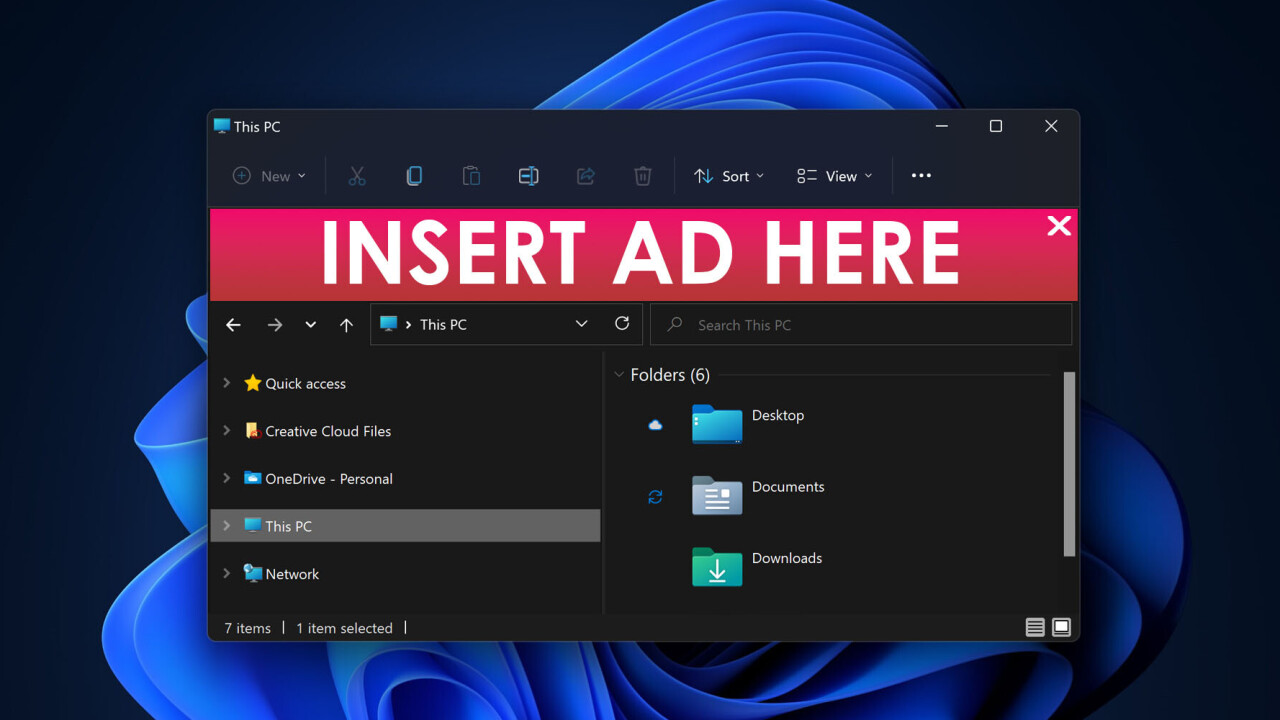
Microsoft often tests new features with its Windows Insider builds. While these are often a sign of good things to come, other times, they need to be nipped right in the bud. Case in point: this week, Microsoft pushed a test to Windows 11 Insiders that placed ads for other Microsoft products directly in the File Explorer, as spotted by Florian Beaubois on Twitter.
Some people will go mad if Microsoft starts adding ads in explorer. pic.twitter.com/rusnyrYyX2
— Florian (@flobo09) March 12, 2022
Microsoft later told The Verge that this ‘feature’ was “not intended to be published externally and was turned off.” Thank goodness, although the company didn’t guarantee that the feature won’t show up in the future.
So let’s get this out the way before someone at Microsoft gets any more funny ideas: puttings ads in File Explorer — or most everyday Windows apps — is a very dumb idea. There are better ways for Microsoft to keep its users updated.
I get that Microsoft probably tests a whole bunch of features that never see the light of day, even for Windows Insiders. The company even recently announced that it would begin testing more experimental features in Insiders builds without announcing them — which is how I initially assumed this ads feature came to fruition.
But the fact that this somehow made it out to the wild means that Microsoft is at least considering throwing more ads into Windows. And absolutely nobody wants that.
It shouldn’t be surprising though. When Microsoft introduced Windows 10 as “as a service”, making it essentially free for most users, it was only natural to assume that the company would increasingly try to find more ways to monetize the platform.
Before the current hullabaloo over ads in File Explorer, Microsoft placed ads in Windows 8 apps. Then it placed ads in the Windows 10 Start Menu. And Microsoft has actually placed ads in the File Explorer before, so even this isn’t totally new. My colleague Abhimanyu summed it up concisely at the time:
They might just be small pop-ups, but that’s how it starts, folks. Microsoft has many other products it might want to start slinging, including Office 365 subscriptions and Skype credits – and who knows whether the company will eventually want to expand to serving up ads from other businesses?
The fact is that companies will tend to gradually sneak in ads into their ‘free’ products to see how much their users are willing to put up with. In their minds, it’s better to ask forgiveness than permission, and if people are conditioned to accept ads for first-party apps, it’s only a matter of time until the company widens its scope.
It’s an unfortunate reflection of most of the software we use in 2022 — you rarely have true ownership of software when everything is a service. Google and Apple aren’t innocent in this regard either; if companies can find a way to make more money off of you, chances are they will.
Mind you, I don’t really have a problem with companies trying to inform users about their new products and features. Microsoft Editor is quite good, and people should know about it!
But there are better ways of keeping users informed. For example, the company already has a tips Widget loaded into your Widgets pane by default. It’s nice! It has some useful tips for everyday users, and the company could promote more of its stuff there.

I even like Beaubois’ suggestion of bringing back the old-school Windows Tip of the Day:
Maybe Microsoft should consider bringing back Tips of the day for stuff like this. I mean, advertise other Microsoft services, @JenMsft 's secret keyboard shortcuts, stuff like this. pic.twitter.com/EiTMfI3Awr
— Florian (@flobo09) March 15, 2022
At least that had an obvious way of letting users opt out, and it doesn’t interfere with other apps and features people use on a regular basis.
It’s when these ads clash with your workflow and cannot be disabled in a highly intuitive manner that it really becomes an issue. Rather than a potentially useful suggestion, these ads are intrusive, reminding you that Windows was never really yours to own in the first place. PCs are supposed to be, you know personal; ads strewn about in random places are anything but.
I don’t know if File Explorer ads will ever become a reality, nor do I expect users will run away to Linux in droves if they ever do. But I do know this won’t be the last time Microsoft considers sneaking more ads into Windows; let’s just hope the company is more considerate when it does.
Get the TNW newsletter
Get the most important tech news in your inbox each week.




